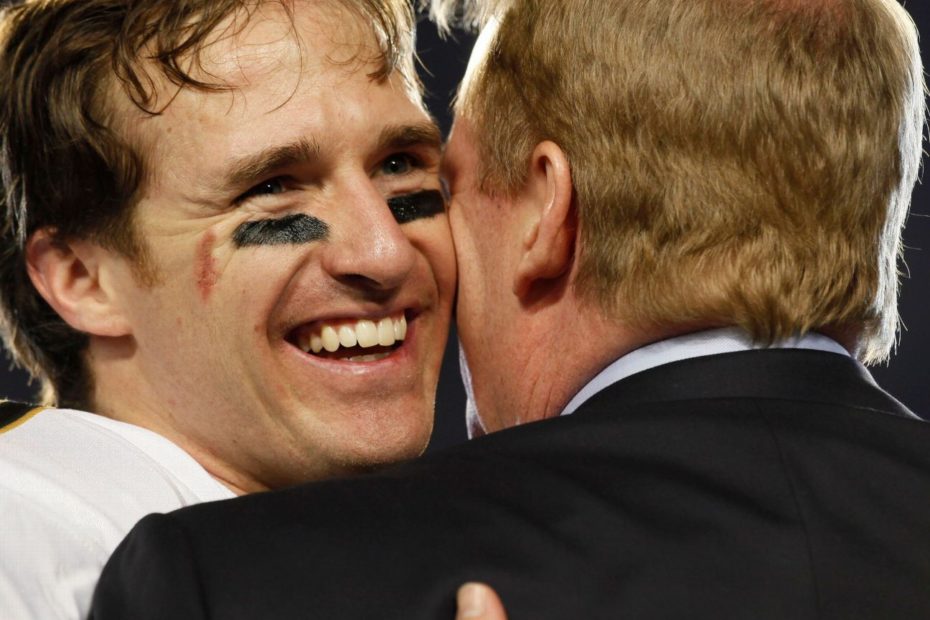METAIRIE, La. — It seemed almost impossible after the fires that were ignited throughout the New Orleans Saints‘ roster on Wednesday that by 9 a.m. Thursday, coach Sean Payton could be tweeting the words, “This is another example of why I love OUR team. #ChangeIsComing”
Payton was applauding team captain and NFL Players Coalition leader Demario Davis, calling Davis a “special man” for the way he went on multiple national TV stations to accept quarterback Drew Brees’ apology and even suggest that it was “leadership at its finest” for Brees to admit his comments on national anthem protests were so misguided.
But Davis wasn’t alone. Other high-profile players — even ones like receiver Michael Thomas who had harshly rebuked Brees on social media a day earlier — also publicly accepted Brees’ apology or expressed optimism that the team could grow stronger from their heartfelt discussions.
Brees drew an overwhelming amount of backlash Wednesday after he reiterated his stance that he will “never agree with anybody disrespecting the flag of the United States of America” during an interview with Yahoo Finance. Brees was asked during the interview how he would feel if players kneel during the national anthem this season to continue protesting racial injustice and police brutality.
Of course these are not wounds that can be healed in one day. And several players made it clear publicly and privately that they are still hurt, disappointed and angry over Brees’ comments.
But what was so important about the teamwide response Thursday was that the Saints showed they could count on so many other leaders to guide them through a difficult situation even when a leader like Brees had become the center of their turmoil.
Davis, Thomas, Alvin Kamara, Cameron Jordan, Terron Armstead, Thomas Morstead and Craig Robertson were among those promoting a path forward. Safety Malcolm Jenkins did not comment publicly Thursday, but sources told ESPN that he and Brees had a positive discourse during an hourlong virtual team meeting Thursday afternoon.
One of my brothers made a public statement yesterday that I disagreed with. He apologized & I accept it because that’s what we are taught to do as Christians. Now back to the movement! #GeorgeFloyd
— Michael Thomas (@Cantguardmike) June 4, 2020
I’ve had a day to digest the comments that Drew made. I was disappointed and hurt. We talked and i explained to him where he dropped the ball and he understood. But now it’s time for us to be part of the solution, not the problem. We have to educate to progress.
— Alvin Kamara (@A_kamara6) June 4, 2020
Brees himself offered two apologies on social media — and others to his teammates in individual conversations and during that team meeting, according to sources.
It was a necessary first step. As one player put it bluntly. “It’s a lot of work to be done. He had no idea of the magnitude of his words. You would assume someone with his knowledge and experience would know better, but he didn’t see it that way. He f—ed up. But I feel he will do everything in his power to make things right.”
By no means has Brees received universal forgiveness. Some players who rebuked his comments Wednesday, including Jenkins, safety C.J. Gardner-Johnson and receiver Emmanuel Sanders, didn’t say anything publicly Thursday. Many other players haven’t spoken up publicly at all.
But those like Davis, who were willing to embrace Brees’ apology while still making it clear his actions need to prove his words are genuine, were taking a first step.
It was Davis, fittingly, who stepped up to replace Brees in leading the team’s emotional pregame huddles last year while Brees was out because of a thumb injury. And now, in a much more important way, he demonstrated this team has strong leadership that goes well beyond its star quarterback.
Of course players were motivated to heal their own team. But even more importantly, players such as Davis and Thomas stressed the importance of putting the focus back on what’s really important here: the outcry against racism and police brutality and the need for real policy changes and social justice reform.
Thomas was a key organizer of a video released Thursday filled with multiple NFL stars urging the league to state that it condemns “racism and the systemic oppression of black people” and was “wrong in silencing our players from peacefully protesting.”
“We all have played a part in helping direct the narrative away from the issues,” said Davis, who told CNN the discussion shouldn’t get bogged down in one player’s “response or statement or apology.”
“At the end of the day, police brutality in America is a problem, racism in America is a problem, systematic injustice is a problem,” Davis said. “And the reason why there are millions of people of all different backgrounds, all different colors, all different ethnic groups in the streets right now protesting — and around the world protesting on behalf of black lives — is because it’s a global outcry.”
Davis added that Brees’ situation can be “very symbolic of America, especially all the ethnic groups that aren’t people of color or black people, in understanding, ‘Hey, it’s OK, you might’ve got it wrong, but don’t get it wrong now.’ And that’s what we have to be as a country. We can’t get it wrong this time.”
Multiple players described their team meeting as positive, with players having direct and heartfelt conversations. They also credited Payton’s leadership for encouraging such a discussion.
“An uncomfortable situation opened up the floor for open lines of communication that will make the locker room stronger [through] better understanding,” said one player who asked not to be identified.
Morstead called it a “vulnerable” and “necessary” conversation, adding, “Hopefully more people around New Orleans and around the country are starting to have some of these difficult conversations.”
